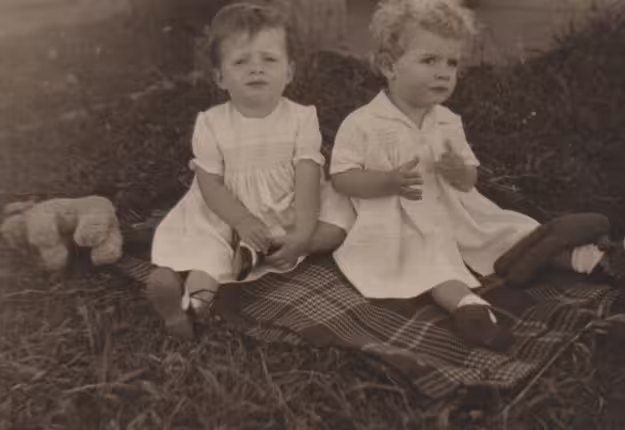Many families wonder if it is possible for just one twin to be autistic, yes it certainly is! I’m the founder of Autistic Twins Triplets and More, and one of the main reasons I started this was because I have fraternal triplets with just one son who is autistic. Here are some things I have learned over the years which might help if you are new on this path.
Explaining autism
It’s important to talk to your twins or triplets about their sibling that has autism. They will notice things on their own and be curious, so we encourage an open and age appropriate conversation with your children to help them better understand autism, how it affect their siblings, and be open about their own feelings about it.

Mary Ann and her twin brother grew up in the 1950s, when nothing was known about autism and people like Johnny were simply put away in institutions. She once asked why Johnny was different. Her mother said “that Johnny’s brain had been damaged at birth due to lack of oxygen. I was the first born twin and in my child’s mind I believed that I had caused his damaged brain. I was plagued with guilt….”
As the eldest of six children, Mary was assigned the role of her twin’s caretaker. She washed and dressed him, fed him and helped him use the toilet. Back then children wouldn’t question their parents, that’s just how it was. Over the years she felt guilt, shame and resentment towards her brother, finally moving overseas in her 20s as a way to escape the burdens of her family life. Now in her 70’s, she has a close bond with her brother, and as wishes more about been known about autism to help both her and her brother as they grew up. She’s written a fictionalised account of the nurse who worked with her brother and had a profound impact on his life.
Individual differences
Whether my triplets were autistic or not, one thing that was important to me always was viewing them as individuals, not “the triplets”. Understanding and embracing the differences between your children is crucial. Each child is unique, and recognizing that one has different needs due to autism, anxiety or sensory processing disorder is the first step towards creating an supportive family. Celebrate their individuality!
Whether they are identical or fraternal – twins, triplets and quadruplets might have a lot of similarities but will have many things that are unique just to them. Support and develop each child’s interests and hobbies. Over the years I have learned a lot as my children explored interests in sports, Pokemon and art. Having a parent that supports and takes an interest in a hobby goes a long way. Children develop their own identities and passions, but also helps them find others with similar interests as they get older. It’s also important not to constantly compare – which is difficult when they are all the same age! Your twins, like any other siblings, will naturally have things that are easier or more difficult for them.
Balancing attention
Balancing attention between your twins can be one of the biggest challenges. Your autistic twin may require more time, especially with therapies and appointments. However, it’s important to make sure the non-autistic twin or triplets don’t feel left out. Try to set aside special one-on-one time with each child. I know this can be very difficult to manage! You might be able to set aside one night a week that is special for each child to get to choose dinner, what to watch on television or what bedtime story to read.
Encouraging empathy and understanding
It’s also important to help your non-autistic twin understand more about autism and how it affects their sibling. Explain autism in a way that’s suitable for their age. Encourage empathy and patience, highlighting that their sibling’s needs might be different, but they’re still just as important. This understanding can foster a supportive relationship and strengthen their bond.
Finding activities that both twins can enjoy together can be a wonderful way to strengthen their bond. Look for games, outings, or hobbies that cater to both their interests and abilities. Shared activities can create happy memories and teach them to enjoy each other’s company. And it’s perfectly okay to have separate activities tailored to each child’s preferences too.
Managing your own feelings
It can be difficult not to feel guilty or jealous, especially when things are new and you are still learning about autism. Dean has twin girls, Penelope and Clementine. Just one of the girls is autistic. He’s proud of Penelope and her typical development, but he feels guilty knowing that Clementine can’t do the same. He doesn’t want his daughter to feel judged about her autism, but he also doesn’t want Penelope to feel she has to hide her accomplishments. It’s a difficult balance the family will work on together.
Marguerite described the same feelings of comparison and mixed emotions when watching her twins Matt and Samantha. She shared that watching “premature babies reach developmental milestones and “catch up”….parents are thrilled and relieved. However, for us, watching Matthew grow and explore the world was bittersweet because we also saw Samantha fall further and further behind”.
Life with twins or triplets can be unpredictable, and flexibility is key. Some days will be more challenging than others, and that’s okay. Celebrate the small victories, be patient with setbacks, and remember that progress takes time. Flexibility will help you adapt to the ever-changing needs of your family. Raising twins, triplets or quadruplets, when one is autistic and the others are not, comes with its unique set of challenges and rewards. You can help all of your children to develop and grow, regardless of their neurodiversity. And always remember, you’re doing an amazing job!
How do you support your children when only one twin, triplet or quadruplet are autistic? Share your stories in the comments below. Be sure to subscribe for the latest news and updates!
This website uses affiliate links. I may make a small commission from purchases when you use these links, at no additional cost to you. As an Amazon Associate I earn from qualifying purchases.




